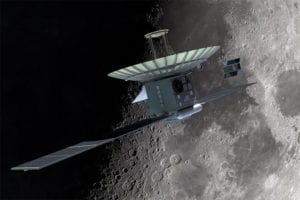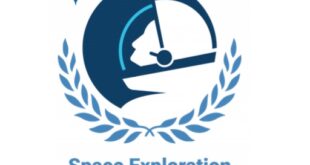
Xplore Inc., a commercial space company has announced they have won an Air Force award to study positioning, navigation and timing (PNT) solutions for cislunar space. The award category, for commercial and technical innovations between the Earth and the Moon — is entirely new for the Air Force, which is investigating the capabilities necessary to extend operations beyond geosynchronous orbit to now include cislunar space.
Today, Earth-orbiting satellites rely on the Global Positioning System (GPS) satellite constellation circling the Earth at an altitude of about 20,000 km (12,427 miles) – to know where they are and how to navigate to a destination. This GPS infrastructure, a public service provided by the U.S. Government, is essential to satellite operations and separately has become an integral part of our daily lives. Smartphones receive GPS signals that allow us to seamlessly perform a wide range of tasks such as planning travel itineraries, hailing a rideshare, viewing local weather or ordering a pizza and tracking its delivery in real-time. Beyond Earth orbit an equivalent positioning and navigation system does not exist. Given this, it can be extremely difficult for spacecraft, landers or rovers on the Moon or on Mars to identify their exact position.
Navigation considerations have been an integral part of Xplore’s development strategy since the company started rigorously developing its platform and multi-mission Xcraft™ — an ESPA-class space vehicle that will fly missions at destinations from Earth to the Moon, Mars, Venus, Lagrange points, near-Earth asteroids (NEAs) and other locations across the inner solar system. Beyond the more obvious hardware requirements for operating in extreme environments, Xplore will maximize the full value of its orbital assets by designing a PNT architecture that mirrors the accessibility and reliability of GPS for cislunar space. The Xcraft’s ability to operate across these vast distances provides tremendous value to customers in academia, industry, civil space and national security agencies.
Xplore Founder Lisa Rich said, “We understood the need to build navigation architectures beyond Earth orbit early in our development and are proud that our thought-leadership has been recognized. Xplore is among the first to win an Air Force award in this groundbreaking new category for missions and services around the Moon. We are uniquely qualified to provide innovative commercial solutions to the Air Force and rapidly advance space domain awareness now that cislunar space operations is a focal point.” She added, “Xplore is honored to respond to the growing and dynamic needs of our national security architecture beyond Earth orbit. We are poised to set new standards across the industry and our exceptional team is excited to provide these foundational capabilities and work with the USAF to ensure mission success.”
Xplore’s ability to design, built and test new PNT architectures beyond Earth orbit will expand the deep space ecosystem and will provide new opportunities for civilian space agencies, national security agencies, sovereign space agencies and commercial space companies to navigate in this challenging environment. Xplore can supply navigation capabilities for Highly Elliptical Orbit (HEO) regimes where typical GPS receivers fail to pick up a signal.
Dr. Clive R. Neal, professor in the Department of Civil & Environmental Engineering & Earth Sciences at the University of Notre Dame, who has over 30 years of experience in advancing our understanding of the Moon said: “Xplore’s solution has strong technical and programmatic merit, and it supports USAF objectives. The company has created a strong plan to use its Xcraft asset to facilitate a precision positioning, navigation and timing architecture to service our growing civil and national security needs. Not only is it a step in obtaining security in the cislunar domain, it provides vital infrastructure for expanding humanity to the Moon, and for creation of a vibrant cislunar economy. This first opportunity for Xplore has good potential.”
Xplore plans to accelerate innovation and commercialize deep space via higher cadence, low-cost missions to the inner solar system. The highly capable Xcraft, a modular next-generation spacecraft, is uniquely designed to service the needs of multiple customers on a single mission, and operate in Low Earth Orbit (LEO), Geostationary Earth Orbit (GEO), cislunar space and deep space.
Dr. Lou Friedman, founder of The Planetary Society and Advisor to Xplore said, “Xplore demonstrated tremendous foresight in their plans for deep space exploration as they build architectures to achieve positioning, navigation and timing between the Earth and the Moon. They understood early on that GPS doesn’t work beyond the Earth, and to navigate beyond Earth, we must develop new technologies to perform in deep space environments.”
Positioning, navigation and timing systems will directly benefit existing and future operations in cislunar and interplanetary space. As Xplore ventures beyond Earth orbit, their new infrastructure will support our nation’s strategy and form essential building blocks for a sustainable cislunar economy.
This announcement was made on 6 April 2020.
 SpaceWatch.Global An independent perspective on space
SpaceWatch.Global An independent perspective on space




